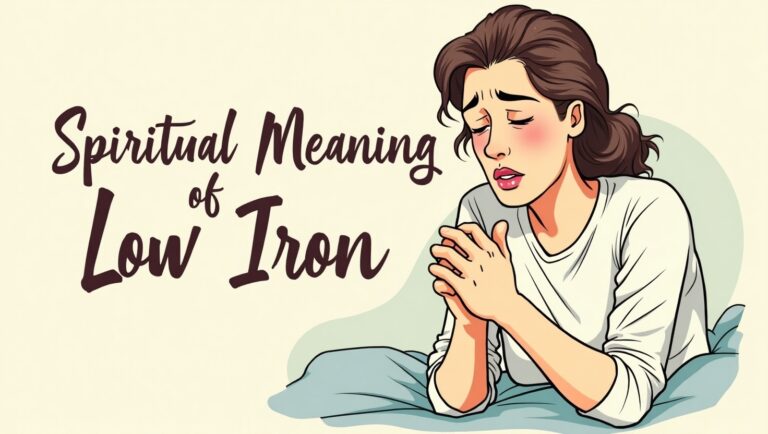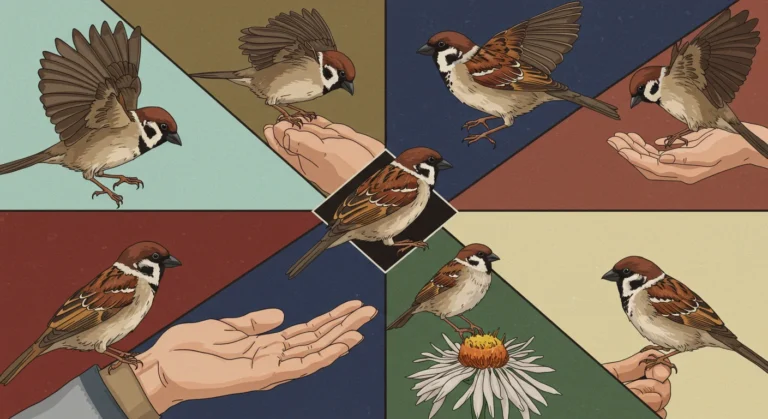Right Buttock Twitching Superstition – Good Luck or Bad Omen!
Among the most common body issues is muscle twitching. A sudden spasm in your right buttock could be such an odd and curious feeling. Why is the Right Buttock Twitching Superstition, after all, is a question that comes to your mind?
Since ancient times, different cultures have been associating muscle twitches with signs of either good or bad things to come. However, the scientific explanation through the perspectives of nerve signals and fatigue could also be valid, for it might be the reason behind them.
But then again, have you considered going through various perspectives, for example, from the standpoint of science as well as folklore? This piece of writing nicely connects the two worlds by studying the reasons why people try to find the solution in the field of crop production and engineering biology conception.
Key Takeaways:
- Right buttock twitches spark curiosity through both superstition and science.
- Cultural beliefs like the buttock twitching omen reflect historical fear of the unknown.
- Muscle twitching meaning varies—some see omens, others look to health factors.
- Modern medicine and ancient traditions both shape how we interpret body signals.
- Understanding origins helps balance belief with evidence-based explanations.
Understanding the Phenomenon of Muscle Twitching:
Muscle twitches are quite common but people still ask the question why they happen. So, let’s go over the mechanism of these events, and voila, everything becomes totally transparent!

What Exactly is a Muscle Twitch?
A muscle fasciculation is an involuntary and rapid contraction in a single muscle fiber, without the muscle as a whole being involved. They’re usually clonic, fast jerky contractions of single muscles almost always in benign conditions and disorders such as dystonias and non-epileptic seizures.
These involuntary muscle contractions can appear everywhere in the human body, for example, in the eyelids or calves, and are usually most disturbing in larger muscles. They are usually fleeting, ranging from seconds to minutes.
Why Is My Right Buttock Twitching Superstition – Cultural Beliefs Explained:
People from different cultures see body twitches in different ways. Some believe they bring luck, while others think they are warnings. Many connect them to spiritual messages. In Western countries, most people see twitches as normal body reactions.
“Superstitions are humanity’s first attempts to understand body signals,” notes cultural anthropologist Dr. Elena Marquez. “They turn physical sensations into meaningful messages.”
Asian Beliefs – A Sign of Good Luck and Wealth:
Many Asian communities share some common superstitious beliefs that right-side twitches intend a good luck or money sign. In China, a twitch in the right middle of the torso means the person will get a higher position in their job or they unexpectedly get wealth or money. Some believe it will be a new job or maybe they will find money unexpectedly.
Indian culture has special knowledge about the energy flow that twitches in the body connote. The right side contains positive energy according to Ayurveda. A twitch at such a place could be a hypothetical signal for an upcoming joyful event. Besides the idea of wedding and hosting travel parties, among those who also see the message will be the one who announces this with the prospects of living a new life.
The majority of those being serious about grounding in these principles are from Asia. To them, an event in which things like this occur is a precondition for not making colossal decisions from that moment on.
Africa Beliefs – Massage from ancestors:
There are many superstitions that various African cultures have. A twitch in the right middle of the body is believed by some to be a message from the ancestors. This could be a cautionary signal to be careful. Some other people interpret it as a sign that the one who brings the good news is coming. One tradition stipulates that a twitch is a visitor.
It might be a friend, relative, or even somebody reaching them to bring an urgent message. Elsewhere, people feel that twitches are a personal shield to their subconscious. They argue that such feelings are an automatic reaction of the body to either a good or bad idea if the body is being watched by hidden companions.
Apart from having these questions answered by ancestors or deities, some elders or wandering shamans also regard the signs as very important things that should be listened to.
Western Views – A Natural Body Reaction:
The only thing that I can’t seem to find is the superstition of right buttock twitches in Western societies. In most places, they prefer to look at them as being normal muscular movements. And the contributions to the main reasons are doctors who affirm that twitches have an intimate connection with tiredness, stress, or dehydration.
One explanation which is quite logical is that a twitched right butt joint could be that a person must sleep or take more water. Apparently, the twitches themselves could also be explained through the trigger effects of anxiety as well as caffeine. In most cases, people who are in lack of sleep are likely to get frequent twitching.
On the other hand, western people do not seek medical help for the twitchings as often as Asians or Africans and they are just on the lookout for such problems through health professionals or the Internet Connection. Consequently, the trend of modernizing and science has seen the decrease in the number of cases of these superstitions among people. If someone is twitching quite a lot, today he will ask a doctor for advice rather than go to a spiritualist.
More For You: Raven Symbolism & Spiritual Meaning!
Superstitions Around Right Buttock Twitching:
Throughout the ages, people of different cultures have considered twitches as either good omens, luck, or spiritual messages. Let’s pick on the most popular beliefs on this subject.

Fortunate Circumstances and Financial Luck:
Keeping up the traditions, some cultures keep circulating the belief that twitching on the right side is a favorable omen.
- Material Gains and Revenue Generation: Certain superstitions make the following claims: If your right buttock twitches, you are probably very close to a significant financial gain.
- Career or Business Gain: Among some people, the right-leg shaking is the symbol of a job/promotion that is going to happen very soon.
- What Equals a Positive Sign: Moreover, there are such thoughts that the right side of the body is the part, where only the energies of goodness are present.
Sign of a Journey:
Another widespread belief is that right buttock twitching signifies an upcoming journey. This superstition varies across different cultures, but the core idea remains the same—movement and travel are in your future.
- Unexpected Travel Plans: If your right buttock twitches, it could mean you will soon embark on a trip. This might be a long-distance journey or a short visit to a place you have never been before.
- Work-Related Travel: Some interpretations suggest that the twitch indicates a professional trip. This could mean an invitation to a business conference, a work transfer, or even migration to a new city or country.
- Personal or Spiritual Journey: Not all journeys are physical. Some believe that the twitch could signify a personal transformation or a shift in perspective.
3. Spiritual Messages:
Some cultures believe that bodily movements such as twitches, carry deeper spiritual meanings. Right buttock twitching is sometimes interpreted as a message from the universe, ancestors, or spiritual guides.
- Someone is Thinking About You: A right buttock twitch, specifically, might indicate that a loved one is missing you or discussing you in a positive light.
- Upcoming Important Decision: If your right buttock twitches, you may need to pay close attention to upcoming choices in your life whether they relate to work, relationships, or personal matters.
- A Message from the Spiritual World: In certain belief systems, body twitches are seen as subtle messages from ancestors, spirits, or a higher power. A twitch in the right buttock could mean guidance or protection from unseen forces.
Eastern Interpretations of Right Buttock Twitching:
In many Asian body superstitions, a twitching right buttock is more than a simple movement. It’s seen as a sign. Traditional Chinese Medicine (TCM) believes that muscle twitches relate to energy paths called meridians. The Chinese muscle twitching meaning often shows if the qi (life force) is out of balance in these paths.
For example, twitches near the buttocks might mean you’re stressed or need more water. This is because the bladder and kidney meridians are close to this area.
Eastern medicine looks at symptoms as a whole. In TCM, doctors might use acupuncture or herbs to balance energy. Ayurveda from India suggests eating warming foods to fix energy imbalances.
These traditions focus on balance between body and environment. While science looks at nerves and salts, Eastern methods stress emotional health and the environment. For instance, a Chinese muscle twitching meaning might suggest meditation to calm the mind, fitting with TCM’s holistic view.
“The body speaks in twitches when the mind and spirit need attention.” — Traditional TCM proverb
Looking into these views gives us a peek into cultures that mix health, spirit, and everyday life. Whether through acupressure or rituals, Eastern ways teach us to see even small twitches as chances for deeper thought.
More For You: Spiritual Meaning of an Itching Face – 5 Key Signs!
Medical Causes of Buttock Twitching – Scientific Explanation:
Not all twitching has a mystical meaning. Many cases have simple medical explanations.

- Muscle Fatigue: The fatigue, which is caused by the repetition of the same action, long sitting, or heavy activities, can produce a sudden muscle contraction that is beyond control.
- Electrolyte Imbalance: The absence of the essential minerals such as magnesium, potassium, and calcium may result in involuntary movements.
- Nerve Compression: Unnatural dragging of nerves in the lower back or buttock area can lead to contractions. One of the most common causes of specific cramps is sciatica.
- Dehydration: The process by which the body’s tissue composition changes due to reduced water intake is called dehydration; this affects the muscle function and results in involuntary movements more frequently.
- Caffeine and Stimulants: Too much coffee, energy drinks, or another type of food that stimulates the nervous system is able to make it overwhelmed.
- Stress and Anxiety: Emotional tension is responsible for the stimulation of the stress hormones, thus making the muscles contract involuntarily. Tensed muscles are the body’s reaction to stress.
5 Simple Strategies to Stop Buttock Muscle Twitching:
Often felt as little muscular leaps, buttock muscle twitching can be irritating or painful. These twitches are simply your muscles malfunctioning; superstitions like money coming or others talking about you have no bearing on them. Luckily, there are easy strategies to quiet this twitching and prevent its return. These five simple ideas, presented in simple language, should help you feel better and maintain relaxed buttock muscles.
Relax Your Muscles with Warmth:
Warmth on your buttocks helps relax tight muscles and increase blood flow, therefore stopping twitching. Twitching can be brought on by tense muscles or irritated nerves; heat helps to relax these conditions. Spend around fifteen minutes on your buttocks covered with a warm cloth or heating pad. Regular warming helps, especially after extended periods of sitting, to reduce twitching and maintain excellent muscle sensation.
Try deliberately relaxing your muscles for:
Muscle relaxation is a basic strategy that may help reduce buttock twitching. This entails spending a few seconds contracting your buttock muscles then gently releasing them while deep breathing. In a quiet area, either sit or lie down; pinch your buttocks for around five seconds then fully relax them. Several times, concentrate on how your muscles feel as they release. Over time, everyday activity helps your buttocks feel less jiggly.
Eat foods meant to combat muscular issues:
Certain foods can help your muscles remain calm and lessen twitching by decreasing inflammation, therefore calming your body from inside. Foods like berries, walnuts, or salmon are beneficial for your muscles, therefore they aid. Great choices also are beverages like green tea and spices like turmeric or ginger. Try to stay away from junk food as it aggravates inflammation; examples of such foods include chips or sweet snacks.
To relax your muscles, get better sleep:
Not enough sleep might aggravate muscle twitching as your body lacks time to relax and heal itself. Every night, try for seven to nine hours of sleep to keep your muscles in good condition. Make your bedroom dark, quiet, and cool; steer clear of consuming coffee or watching TV before bed. Sleeping with a pillow beneath your legs will assist blood flow to your buttocks, therefore preventing twitching.
See a doctor to check your meds:
As a side effect, several medications, including those for blood pressure or cholesterol, might cause your muscles to twitch. See your doctor if your buttocks begin to swell after the commencement of a new medication. They could advise anything to help or check to see whether the medication is aggravating the issue. Examining your medications will help to prevent twitching and maintain proper muscle tone.
More For You: What Does an Itchy Index Finger Superstition Mean?
Common Myths About Buttock Twitching Debunked – Facts vs. Fiction:
Buttock twitching, or muscle spasms or fasciculations, is a frequent occurrence that generally generates curiosity and superstition. Most individuals connect right or left buttock twitching with folklore related to money, luck, or gossip. Let us bust these popular myths with facts grounded in science to dispel misconceptions.
Myth 1 – Right Buttock Twitching Indicates Money Is Coming:
Reality: No scientific evidence links right buttock twitching to financial gain or wealth. This superstition likely stems from cultural folklore, but it lacks any basis in medical or scientific research. Muscle twitching in the buttocks is typically caused by involuntary muscle contractions, often triggered by stress, fatigue, dehydration, or electrolyte imbalances. If you’re hoping for a financial windfall.
Myth 2 – Buttock Twitching Indicates That Someone Is Discussing You:
Reality: The notion that buttock twitching indicates that someone is talking about you is another superstition-based myth, not a scientific fact. Buttock twitching on the right or left side occurs because of muscle spasms, usually from nerve irritation, activity, or prolonged sitting. These spasms are not related to social interaction or discussion about you.
FAQs:
What does right-side twitching mean spiritually?
In many cultures, right-side twitching is seen as a sign of good luck, positive energy, or an upcoming event. Some believe it is a message from ancestors or a spiritual guide.
Why is my right pec twitching?
Muscle twitches in the right pec often result from stress, fatigue, dehydration, or excess caffeine. If persistent, it may indicate a nerve or muscle issue.
What does it mean when you twitch in superstition?
Superstitions link twitching to omens. Some see it as good luck, while others believe it’s a warning or a message from the spiritual world.
How can I relieve muscle twitching in my buttocks?
To stop muscle twitching, try stretching your gluteal muscles. Make sure you drink enough water and eat well. Also, try to relax and consider taking magnesium or potassium supplements.
When should I seek medical advice for my muscle twitching?
See a doctor if your twitching doesn’t go away, hurts, or makes you weak. Also, if it moves to other parts of your body. Getting checked early can help find any health issues.
Why is my lower right cheek twitching?
Lower right cheek twitching is often caused by stress, eye strain, or lack of sleep. Some superstitions suggest it signals upcoming news or someone thinking about you.
Conclusion:
Studying the logic behind a right buttock twitching leads us through the intermingling of both ancient folkloric concepts and modern scientific findings. With their informative ideas and updated details, past consigns and present experiments can equally be a source of enlightenment.
They contribute to a comprehension of physiology and mental health and suggest alternatives to feel well. It’s not good just to look into part of us rather than all of the body. This, in turn, implies that we must respect ancient stories apart from devoting our time and energy to healthcare issues.
It is likely that muscle twitches will be caused by improper eating habits or high levels of stress. Affecting only small everyday habits like stretching exercises or looking for doctor’s advice can lead to a significant improvement in your health.







